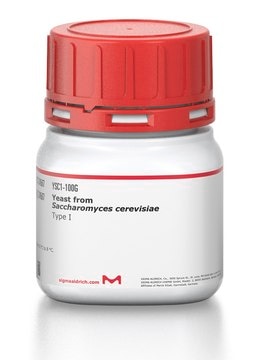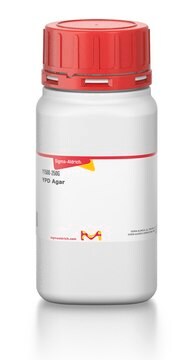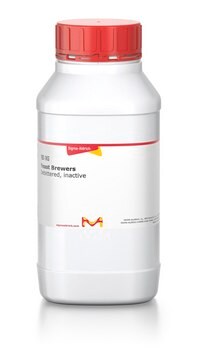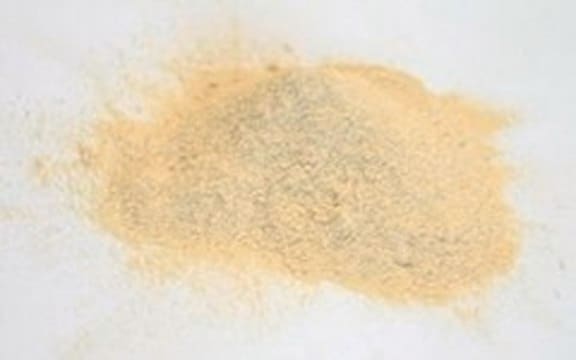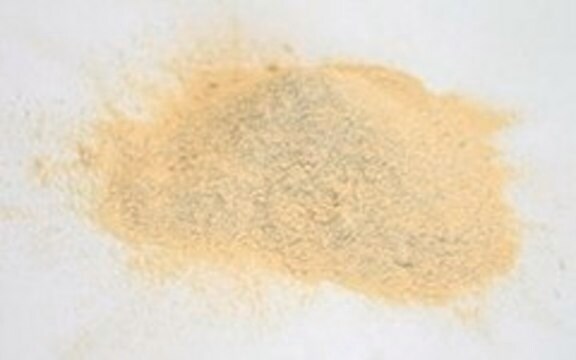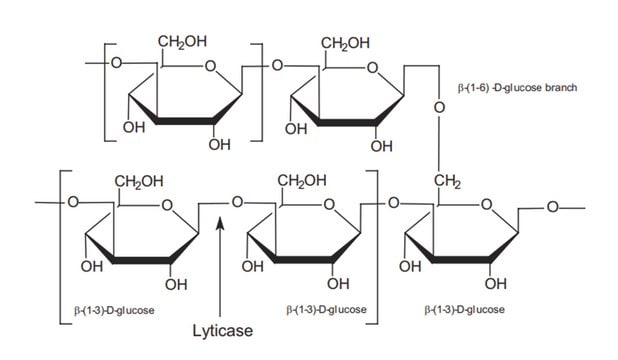YSC2
Yeast from Saccharomyces cerevisiae
Type II
Synonym(s):
(Bakers yeast)
Sign Into View Organizational & Contract Pricing
All Photos(2)
About This Item
UNSPSC Code:
12352202
NACRES:
NA.24
Recommended Products
biological source
Saccharomyces cerevisiae
Quality Level
type
Type II
form
powder or solid
application(s)
food and beverages
microbiology
storage temp.
2-8°C
Related Categories
Application
Yeast from Saccharomyces cerevisiae has been used:
- in yeast sample preparation for tube-gel electrophoresis (TGE) fractionation
- as a diet supplement to study its effect on the utilization of food waste as a diet for grass carp
- for fermentation of miscanthus and the cellulose-rich extract samples to produce ethanol
Biochem/physiol Actions
Saccharomyces cerevisiae is a unicellular fungus. Yeast from S. cerevisiae is the widely used yeast species in bread and sourdoughs. It is used to produce several fermented beverages (cider, beer, 85s, and wine) and distilled beverages (brandy, sake, vodka, and whisky). S. cerevisiae has better tolerance for fermentation stresses than any other yeast species. Hence, it is a preferred starter culture for industrial fermentation.
Caution
Only approx. 10% will autolyze in aqueous buffer at 37 °C.
Preparation Note
Fast dried to yield 90% active, viable yeast in a convenient solid form.
Storage Class Code
11 - Combustible Solids
WGK
WGK 3
Flash Point(F)
Not applicable
Flash Point(C)
Not applicable
Personal Protective Equipment
dust mask type N95 (US), Eyeshields, Gloves
Choose from one of the most recent versions:
Already Own This Product?
Find documentation for the products that you have recently purchased in the Document Library.
Customers Also Viewed
Sivasamy Sethupathy et al.
Frontiers in microbiology, 11, 584812-584812 (2020-11-17)
Indole and its derivatives have been shown to interfere with the quorum sensing (QS) systems of a wide range of bacterial pathogens. While indole has been previously shown to inhibit QS in Serratia marcescens, the effects of various indole derivatives
Margaret Clarke et al.
PloS one, 5(1), e8585-e8585 (2010-01-07)
The vacuolar H+-ATPase, or V-ATPase, is a highly-conserved multi-subunit enzyme that transports protons across membranes at the expense of ATP. The resulting proton gradient serves many essential functions, among them energizing transport of small molecules such as neurotransmitters, and acidifying
Lacrimioara Senila et al.
Molecules (Basel, Switzerland), 25(11) (2020-06-07)
In this paper, the production of a second-generation bioethanol from lignocellulosic vineyard cutting wastes was investigated in order to define the optimal operating conditions of the autohydrolysis pretreatment, chlorite delignification and simultaneous saccharification and fermentation (SSF). The autohydrolysis of vine-shoot
Eric J Kalivoda et al.
PloS one, 8(7), e71267-e71267 (2013-08-08)
Biofilm-related infections are a major contributor to human disease, and the capacity for surface attachment and biofilm formation are key attributes for the pathogenesis of microbes. Serratia marcescens type I fimbriae-dependent biofilms are coordinated by the adenylate cyclase, CyaA, and
Pretreatment of miscanthus using 1, 3-dimethyl-imidazolium methyl phosphonate (DMIMMPh) ionic liquid for glucose recovery and ethanol production
Hassan El-Sayed RE, et al.
Royal Society of Chemistry Advances, 5(75), 61455-61464 (2015)
Our team of scientists has experience in all areas of research including Life Science, Material Science, Chemical Synthesis, Chromatography, Analytical and many others.
Contact Technical Service